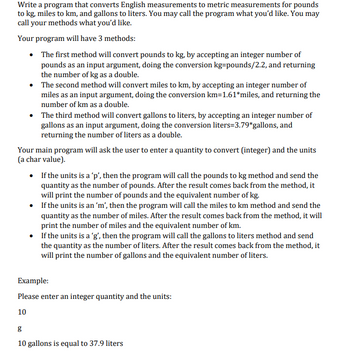
Database System Concepts
7th Edition
ISBN: 9780078022159
Author: Abraham Silberschatz Professor, Henry F. Korth, S. Sudarshan
Publisher: McGraw-Hill Education
expand_more
expand_more
format_list_bulleted
Question
Code need to be in java

Transcribed Image Text:**Program for Converting English Measurements to Metric Measurements**
This program is designed to convert English measurements to metric measurements for pounds to kilograms, miles to kilometers, and gallons to liters. You can name the program and its methods as you like.
### Program Structure
Your program will include three main methods:
1. **Pounds to Kilograms Method:**
- Accepts an integer number of pounds as input.
- Converts pounds to kilograms using the formula: \( \text{kg} = \frac{\text{pounds}}{2.2} \).
- Returns the result as a double representing the number of kilograms.
2. **Miles to Kilometers Method:**
- Accepts an integer number of miles as input.
- Converts miles to kilometers using the formula: \( \text{km} = 1.61 \times \text{miles} \).
- Returns the result as a double representing the number of kilometers.
3. **Gallons to Liters Method:**
- Accepts an integer number of gallons as input.
- Converts gallons to liters using the formula: \( \text{liters} = 3.79 \times \text{gallons} \).
- Returns the result as a double representing the number of liters.
### Main Program Functionality
The main program prompts the user to enter an integer quantity and specify the units (as a char value):
- If the input unit is 'p', the program calls the "pounds to kg" method to convert the input, then displays the number of pounds and the equivalent kilograms.
- If the input unit is 'm', the program calls the "miles to km" method to convert the input, then displays the number of miles and the equivalent kilometers.
- If the input unit is 'g', the program calls the "gallons to liters" method to convert the input, then displays the number of gallons and the equivalent liters.
### Example
```
Please enter an integer quantity and the units:
10
g
```
Output:
```
10 gallons is equal to 37.9 liters
```
Expert Solution
This question has been solved!
Explore an expertly crafted, step-by-step solution for a thorough understanding of key concepts.
This is a popular solution
Trending nowThis is a popular solution!
Step by stepSolved in 3 steps with 1 images

Knowledge Booster
Learn more about
Need a deep-dive on the concept behind this application? Look no further. Learn more about this topic, computer-science and related others by exploring similar questions and additional content below.Similar questions
- Java requires its method arguments to be sent in as values, not references. And what, precisely, does it entail?arrow_forwardIN RUBY Write a function that returns the distance the snail must travel to the top of the tower given the height and length of each step and the height of the tower. Examples total_distance(0.2, 0.4, 100.0) → 300.0 total_distance(0.3, 0.2, 25.0)→ 41.7 total_distance (0.1, 0.1, 6.0) → 12.0arrow_forwardWhat are all the different kinds of characters and strings that may be used in Java?arrow_forward
- JAVA Data type Java assignment meaning of operator int float double and string Pick one Java polymorphic arithmetic operator and write Java code statements that demonstrate its function for ints, floats, doubles, and strings. Also, indicate what role the operator is performing in the table below.arrow_forwardHow can composition reduce the work of a Java programmer?arrow_forward
arrow_back_ios
arrow_forward_ios
Recommended textbooks for you
 Database System ConceptsComputer ScienceISBN:9780078022159Author:Abraham Silberschatz Professor, Henry F. Korth, S. SudarshanPublisher:McGraw-Hill Education
Database System ConceptsComputer ScienceISBN:9780078022159Author:Abraham Silberschatz Professor, Henry F. Korth, S. SudarshanPublisher:McGraw-Hill Education Starting Out with Python (4th Edition)Computer ScienceISBN:9780134444321Author:Tony GaddisPublisher:PEARSON
Starting Out with Python (4th Edition)Computer ScienceISBN:9780134444321Author:Tony GaddisPublisher:PEARSON Digital Fundamentals (11th Edition)Computer ScienceISBN:9780132737968Author:Thomas L. FloydPublisher:PEARSON
Digital Fundamentals (11th Edition)Computer ScienceISBN:9780132737968Author:Thomas L. FloydPublisher:PEARSON C How to Program (8th Edition)Computer ScienceISBN:9780133976892Author:Paul J. Deitel, Harvey DeitelPublisher:PEARSON
C How to Program (8th Edition)Computer ScienceISBN:9780133976892Author:Paul J. Deitel, Harvey DeitelPublisher:PEARSON Database Systems: Design, Implementation, & Manag...Computer ScienceISBN:9781337627900Author:Carlos Coronel, Steven MorrisPublisher:Cengage Learning
Database Systems: Design, Implementation, & Manag...Computer ScienceISBN:9781337627900Author:Carlos Coronel, Steven MorrisPublisher:Cengage Learning Programmable Logic ControllersComputer ScienceISBN:9780073373843Author:Frank D. PetruzellaPublisher:McGraw-Hill Education
Programmable Logic ControllersComputer ScienceISBN:9780073373843Author:Frank D. PetruzellaPublisher:McGraw-Hill Education

Database System Concepts
Computer Science
ISBN:9780078022159
Author:Abraham Silberschatz Professor, Henry F. Korth, S. Sudarshan
Publisher:McGraw-Hill Education

Starting Out with Python (4th Edition)
Computer Science
ISBN:9780134444321
Author:Tony Gaddis
Publisher:PEARSON

Digital Fundamentals (11th Edition)
Computer Science
ISBN:9780132737968
Author:Thomas L. Floyd
Publisher:PEARSON

C How to Program (8th Edition)
Computer Science
ISBN:9780133976892
Author:Paul J. Deitel, Harvey Deitel
Publisher:PEARSON

Database Systems: Design, Implementation, & Manag...
Computer Science
ISBN:9781337627900
Author:Carlos Coronel, Steven Morris
Publisher:Cengage Learning

Programmable Logic Controllers
Computer Science
ISBN:9780073373843
Author:Frank D. Petruzella
Publisher:McGraw-Hill Education